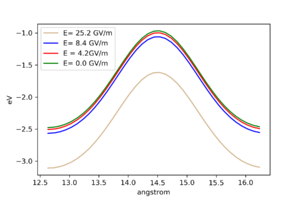EchemDID: Difference between revisions
From Intelligent Materials and Systems Lab
No edit summary |
No edit summary |
||
| Line 9: | Line 9: | ||
The default cut-off for the Coulombic interaction for the Qeq scheme used in EchemDID is 15 Å. Did tests with 20, 30,40.... 100 Å with the distance between plates being 18 Å. Found out that at higher cut-off values, the scheme breaks down entirely. The force and charge distributions become increasingly unphysical. Probably better to use the pre-determined cut-off value parametrized for the force field, even though this might cause the known problems. | The default cut-off for the Coulombic interaction for the Qeq scheme used in EchemDID is 15 Å. Did tests with 20, 30,40.... 100 Å with the distance between plates being 18 Å. Found out that at higher cut-off values, the scheme breaks down entirely. The force and charge distributions become increasingly unphysical. Probably better to use the pre-determined cut-off value parametrized for the force field, even though this might cause the known problems. | ||
'''Potential landscapes for different electric fields''' | |||
Did tests with different electric fields by moving a test atom on 100 surface by one lattice constant. | |||
[[File:Pe-efield.png|thumb]] | |||
Revision as of 16:24, 13 September 2018
Testing with variable cut-offs:
/home/kristian/sshfs/rocket/echemtest/validation/forces_capa/test_cutoff
The default cut-off for the Coulombic interaction for the Qeq scheme used in EchemDID is 15 Å. Did tests with 20, 30,40.... 100 Å with the distance between plates being 18 Å. Found out that at higher cut-off values, the scheme breaks down entirely. The force and charge distributions become increasingly unphysical. Probably better to use the pre-determined cut-off value parametrized for the force field, even though this might cause the known problems.
Potential landscapes for different electric fields
Did tests with different electric fields by moving a test atom on 100 surface by one lattice constant.
